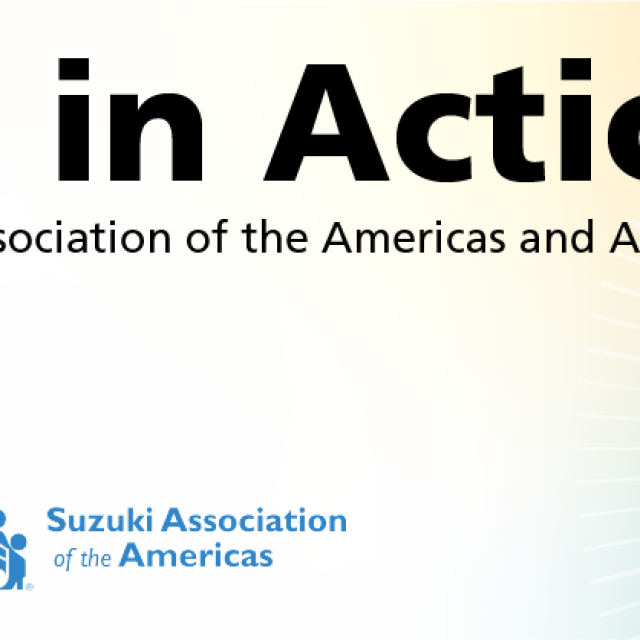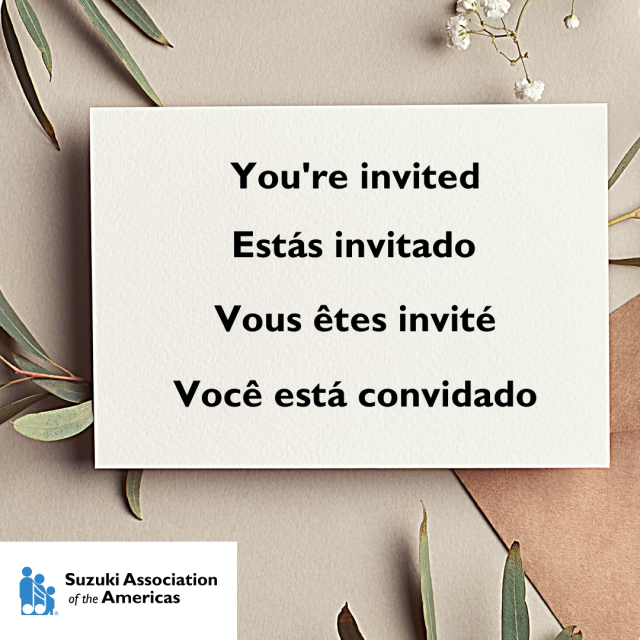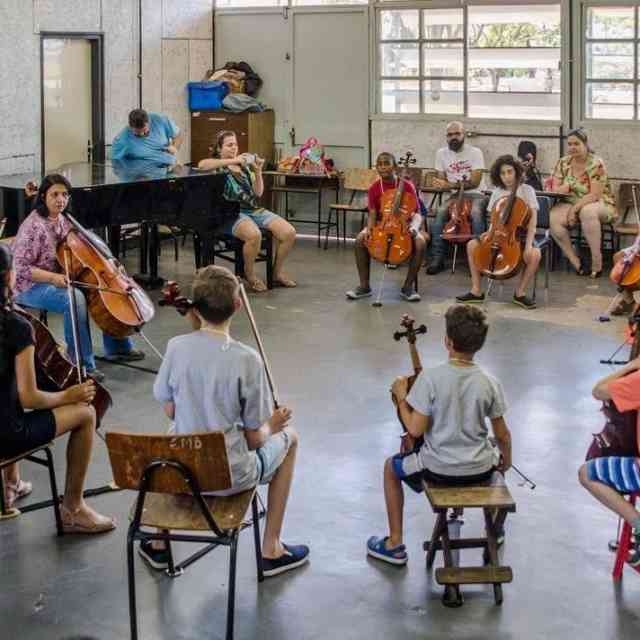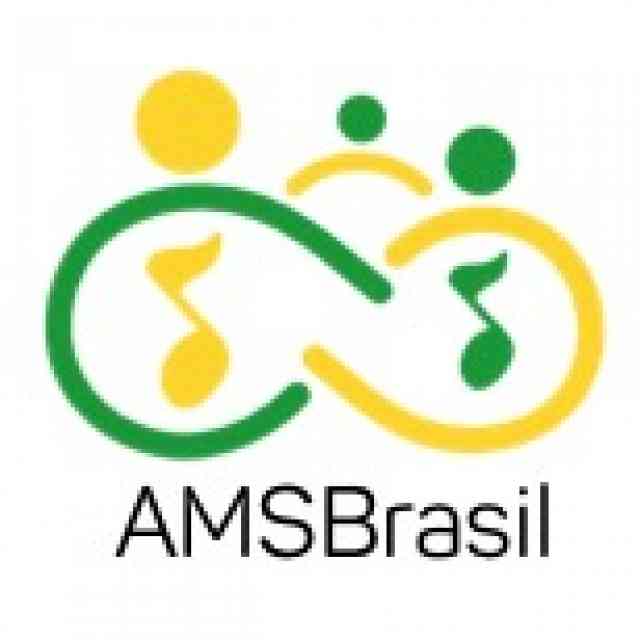Brazil is a continental country due to its great territorial extension, and it is also rich in cultural diversity. Few people have a real notion of how much this extension unites us and separates us at the same time, as if there were many "Brazils" to get to know and explore. One of these regions that has a lot to reveal is the North Region, both in its greenness and in its culture. The largest state in this region (and in the country) is Amazonas, home to one of the country’s major opera festivals and one of the most beautiful theaters in the world. Its capital, Manaus, is a vibrant city of 2.1 million people that is a center for both traditional and modern cultural activity.
In Amazonas, the Suzuki Method found a welcome home. The first boom happened with the coming of foreigners from "El Sistema vezenoelano" around 1999, in a conjunction with the founding of the state orchestra and the creation of a large music school, a social project named after Cláudio Santoro. In this first stage, the approach prioritized the reading of music pieces of Shinichi Suzuki’s books, and very little or almost nothing about the philosophy. This was different from the other regions of Brazil, where there were already well-known Suzuki Schools, such as the Centro Suzuki de Campinas, attesting to the lack of contact between Brazilian regions.
It took approximately twenty years for the students of that first generation to graduate on their instruments and to get to know the Suzuki Method more deeply through the certified courses. They then went on to create the Centro Suzuki Amazonas and to hold the first major Suzuki events in the capital city. It was in this context that the second Suzuki Method boom occurred in Manaus, marked by I Encontro Suzuki Amazonas, an event that brought together schools from different regions of Brazil with the purpose of harmonizing the dreams of students and teachers. This project was accomplished through partnerships between the Centro Suzuki Amazonas, Centro Suzuki de Brasília, and Música para Crianças of the Universidade de Brasília MPC/UnB. These connections were important years later for the realization of the Vamos Tocar? Vacation Course for Violinists, a project that overcame the pandemic by bringing together Brazilian violinists in a series of online meetings. This article aims to report on the Suzuki events held in Manaus and the creation of partnerships from different regions of Brazil. Thus, it will be important to know the partners who built these connections that were fundamental for the realization of these events.
Schools Involved in the Suzuki Movement in Manaus
Founded in 2017, the Centro Suzuki Amazonas was the first music school dedicated entirely to the Suzuki methodology. This year, it completes five years and currently has fifty students of SECE, violin, viola, cello and piano, under the direction of Bárbara Soares and Débora Batista. The school has also encouraged the restructuring of the Musicando Project of the University of the State of Amazonas (UEA), which serves children from all social classes, distant neighborhoods, vulnerable areas, and those with disabilities, such as those on the autistic spectrum.
The Centro Suzuki de Brasília was created in 2013, and currently offers courses in violin, viola, cello, recorder, piano, guitar, early childhood education, singing, and brass. Up until 2018, the school had a pedagogical and structural partnership with the project "Music for Children", from the University of Brasilia. The Centro Suzuki de Brasília actively works to form a solid community that revolves around music and the principles of human development from the Suzuki philosophy. It fosters the pedagogical development of teachers, having promoted training courses and workshops throughout its history. Its students and teachers actively participate in meetings and festivals in Brazil and abroad, including countries such as Peru, Argentina, Mexico, Colombia, and the USA.
Music for Children was approved as a university extension project by the University of Brasilia in 2002 with the mission of “establishing a partnership between the university and families for the benefit of children. To allow music to be a fundamental part in the human development of Brazilian children" (Freire 2008, 7). Over the years, the project has gained new students, leading to formation of new classes and the training of teachers to serve the local community. In addition, the environment became a fruitful soil for the development of research on early childhood teaching and learning and instrument initiation. In 2018, the project was renamed the MiFáSol-Lá School of Music.
First Amazon Suzuki Meeting
The I Encontro Suzuki Amazonas (First Amazon Suzuki Meeting) was held in 2018 with the purpose of creating a musical and cultural exchange for Suzuki students from the cities of Manaus and Brasília. The partnerships created by the Centro Suzuki Amazonas, Centro Suzuki de Brasília, and the project Music for Children were essential for the planning and realization of the event. The opening of the event welcomed the participation of the Youth Orchestra of the University of Brasilia, formed mostly by Suzuki students. Musicians and their families accepted the invitation to play in one of the most beautiful opera houses in the world, the Teatro Amazonas. In addition, the project received fundamental support from the State Secretary of Culture and Creative Economy of Amazonas, who opened the doors of the theater for the orchestra to perform together with Suzuki students from Manaus. The event was also supported by the Associação Musical Suzuki do Brasil, Centro de Artes of the Universidade Federal do Amazonas (CAUA/UFAM), Escola de Violão Daniel de Lima, and Centro Suzuki de São José dos Campos. There were days of masterclasses, group classes, workshops for violin, guitar and cello students, and workshops for parents and instrument teachers. It was possible to observe cultural exchanges during the classes and presentations. For many, it was their first experience in getting to know the diversity of the Amazon rainforest and especially to play in an opera theater. For others, it provided an opportunity to meet guest teachers and Suzuki students from the most advanced books, and to play the same repertoire together. The event was a milestone for the participants due to the rich cultural experiences, as it generated significant learning, stories, and musical insights for students and families from Manaus and Brasília.
Vamos tocar? Violinists’ Vacation Course: The Pandemic’s Way Out
The pandemic brought challenges for students and instrumental teachers around the world. In Manaus, concerts and cultural activities were canceled in March 2020 due to COVID-19. This context led to the creation of the project Vamos tocar? Curso de Férias para Violinistas (Let’s Play? Violinists’ Vacation Course), made possible by the Program Creative Culture—2020 and the Aldir Blanc Law through the Feliciano Lana Award from the Amazonas State Government, supported by the federal government through the Ministry of Tourism, Special Secretary of Culture and the National Fund of Culture. In Brazil, the Aldir Blanc Law to support culture was sanctioned in 2020 with the goal of fostering cultural projects with emergency actions for artists and culture workers. The online and free event took place May 7–9, 2021 with the support of Centro Suzuki de Brasília and Centro Suzuki Amazonas.
The program was structured for children, youth, adults, beginners, and university students with the purpose of motivating their studies through masterclasses, workshops and group classes. The event attracted the attention of Brazilian and foreign violinists, with more than one hundred participants. The project also encouraged the participation of students who are not part of the Suzuki community. The classes were represented by the trees of the Amazon Rainforest: Samaúma, Angelim, Buriti, Castanheira, and Seringueira. Using the names of the trees was a way for the participants to get to know the beauties of the Amazon. The group classes were held by teachers trained by the Suzuki Association of the Americas. The activities ranged from reviewing the posture of the violin and the bow hand, musical composition, solos, and questions about the trees of the classes, foods, and the cities of each one. In addition, the participants of the group classes were challenged to record an arrangement of a Brazilian folk song, “Cravo Brigou com a Rosa” and “Twinkle Twinkle Little Star” for the project’s final concert.
According to Suzuki, "cultural and musical aptitude does not come from within, is not inherited, but occurs through favorable environmental conditions" (Suzuki 2008, 23). Besides playing with each other, the purpose of the classes was for the participants to get to know a bit of each other’s culture. The father of a student from Manaus highlighted the atmosphere of the classes, reporting: "We could observe the healthy and motivating exchange of people from different regions united by the pleasure of learning and making music, and the zeal to promote and spread our rich Amazon region" (Verde 2021, 118). During the classes, it was possible to witness the interaction of participants and teachers from different cities through the activities. Professor Théo highlighted: "I saw a lot of gratitude in everyone’s eyes, and in times like these it is very good to be able to transform people’s lives in such a special way" (Verde 2021, 120). About this context, Laura reported: "Those were days when we shared more than musical experiences and technical aspects of the violin, we talked about our regional cultures, music, and experiences.” The teacher expressed: "being able to make music with children from all parts of our country, online, in such a delicate moment as the one we are living through, was invigorating for all of us who were together these days" (Verde 2021, 120). Professor Bruno pointed out that "the interaction between students from very different regional cultures, united by a common good, music" was registered in his memory. The teacher revealed that "friendships that were born in the project already extend beyond it, and that is priceless!" (Verde 2021, 120).
At the end of the event, we were able to follow the lasting effects on participants and teachers, because "it was possible to identify important elements such as affectivity, interaction and emotion in favor of the motivation of the participants despite the pandemic context, at the end, everyone left a little more persevering in their studies, with hope for better days, joy and gratitude in the heart" (Verde 2021, 121). In addition, the project was highlighted in the cultural agenda of Manaus, presented in academic conferences and in the Online Conference "We are Suzuki," promoted by Suzuki Association of the Americas in May 2021. The event was an opportunity to share the Suzuki activities of our rich and immense Brazil.
According to Dos Santos and Hackbarth (2016), "in 2015 alone, there were more than 350 enrollments in teacher training courses" and this data shows the great interest of the Brazilian teachers in the Suzuki Method. Much of this is due to the remarkable pedagogical impact of the Suzuki Association of the Americas’s incentives and scholarships, and partnerships and other facilitators to access training courses. It is through this multilateral interest that the Suzuki movement reaches so far away, as was the case in the North region of Brazil, a fact that culminated in the realization of these events in Manaus with the purpose of bringing together Suzuki communities from different regions of Brazil. The partnerships built provided cultural exchanges between students and teachers, the opportunity to get to know the beauties of the Amazon Rainforest, and especially created musical experiences for children, youth, and adults. This report brings reflections about these Suzuki encounters, about the way they interweave knowledge, collaboration, and friendship in different contexts. But music is always the thread that wraps the seams and bonds of life with kindness, beauty, and gratitude.
References
Dos Santos e Hackbarth. 2016. I Encontro Brasileiro de Professores e alunos Suzuki: Construindo Comunidades. Colorado, May 23, 2016. https://suzukiassociation.org/news/i-brazilian-meeting-suzuki-teachers-students/
Freire, Ricardo J. D. 2008. Implementação e estruturação de um projeto de musicalização infantil: relato de experiência. Anais do XVII Encontro Nacional da ABEM. São Paulo, Brasil, October 2008. https://www.yumpu.com/pt/document/view/26905919/implementacao-e-estruturacao-de-um-projeto-de-abem
Suzuki, Shinichi. 2008. Educação é Amor. Santa Maria: Pallotti.
Verde, Lima Juliana. 2021. Vamos tocar? Curso de Férias para Violinistas—Um relato de experiência das atividades em formato remoto. Annals—XI Encontro de Pesquisa e Extensão do Grupo Música e Educação—MusE, v.1, n.1 p. 116-122 Set. 2021. ISSN: 2446-5143. Florianópolis, September 2021. https://grupodepesquisamuse.files.wordpress.com/2015/04/anais-do-iv-encontro-do-muse.pdf










